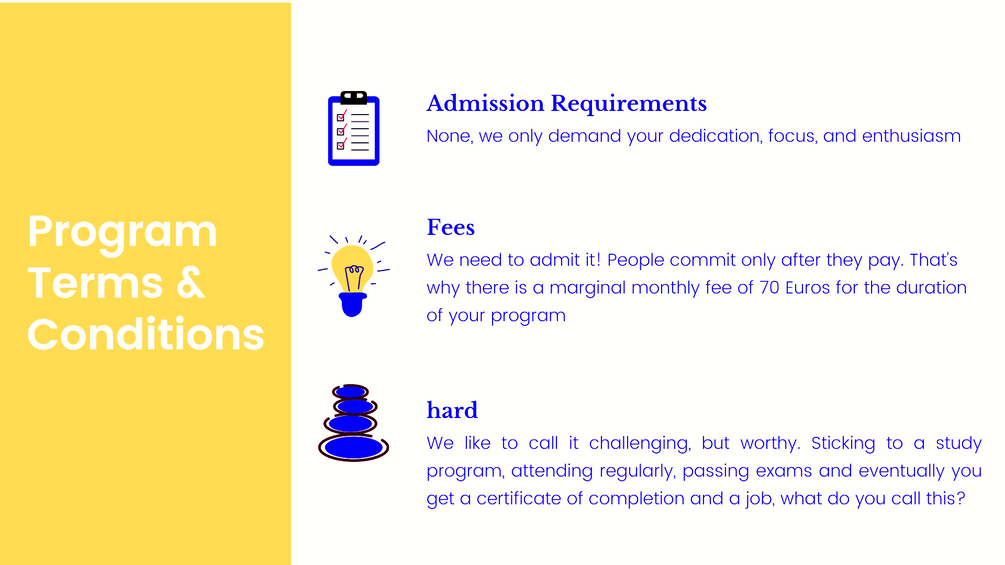M&S Research Hub Academy
"Applied Econometrics" Diploma Program
Complete & Get Hired
Get Better at Understanding, Applying, and Teaching Applied Statistics, Progmetrics, & Econometrics.
Earn a certified diploma in "Applied Econometrics"
After graduation, qualified academy trainees will receive a formal job offer to join the M&S Research Hub Academic Team.
Admission is Closed
Deadline: 31 March 2025
i'M Ryan
Hire of the Summer Intake 2021
Ryan (Asia Desk, Asian Development Bank, OECD Development Centre, France,)
is the first graduate to join our academic team after completing the prog-metrics program in 2021. His cumulative grades, skills, and dedication qualified him for this position.
Step ONE
Step TWO
Step THREE
Choose between the two programs or choose to parallelly enroll in both, read program terms, fill out the admission form, and await the admission decision after one-two week.
In case of a positive decision, you will recieve an email with all related logistics, access codes to start your training following the announced schedule.
After regularly attending your hybrid training classes and passing the assessment exam after each module with a minimum score of 75%, you will receive your certificate of completion along with an invitation for a formal job interview to join our team as a junior academic trainer.
Program One
Applied Statistics
3-5 Months | Selfpaced learning
Module 1:
Basic econometrics
View from the content:
- Classical linear regression assumptions
- Specification problems
- OLS
- Single & multiple regression models
- WLS, GLS and FMGLS new
Duration: 9 Hours
Module 2:
Time-series econometrics in STATA and Eviews
View from the content:
- Stationarity & model selection criteria
- Cointegration and causality
- Dynamic time series models (e.g. VAR, XVAR, SVAR, VECM)
- ARDL, ARMA & ARIMA
- Volatility models: ARCH family
- HAC Estimators new
- In and out-sample Forecasting new
- Intro. to Mixed Data Sampling (MIDAS) Methods new
Duration: 28 Hours
Module 4:
Advanced topics in STATA and Eviews
View from the content:
- Nonlinearity: testing & appropriate models
- Structured equation modeling
- Logit & Probit models
- Censored & Truncated models
- Endogeneity and instrumental variables model
- Treatment effect Models new
Duration: 27 Hours
Module 3:
Panel data econometrics in STATA and Eviews
View from the content:
- Panel specification tests (Chow, wald, panel unit root, Hausman, etc.)
- Pooled OLS, fixed, dynamic fixed & random-effects models.
- Dynamic panel models: DPD, panel VAR & GMM
- IV models
- Panel ARDLnew
- Panel Data for Limited dependent variablesnew
- DCC under GMM new
- Dynamic Threshold new
- Intro to Global VAR new
Duration: 30 Hours
Program Two
Prog-Metrics
2-3 Months | Self-paced learning
Prerequisites: These are practical tutorials using R and Python only, participants need to have above-average knowledge of the theory and structure of these models.
Module 1 (Prog-Metrics):
Basics Using R
(Practical labs only)
View from the content:
- Introduction to R
- Data in R
- Regression Analysis
- Time Series Analysis
Volatility models (ARIMA and GARCH systems) and Multivariate Endogenous Models (VAR Family)
- Panel Econometrics: Fixed, Random effects and Dynamic models GMM.
Duration: 6-8 Hours
Module 2 (Prog-Metrics):
Advanced Topics Using R
(Practical labs only)
View from the content:
- Introduction to R
- Data in R
- Quantile Regression
- Parametrics Regressions
linear regression, logistic regression, probit regression, and negative binomial regressions
- Nonparametrics Regressions: splines and kernel regressions
Duration: 7-9 Hours
Module 3 (Prog-Metrics):
Common Models Using Python
(Practical labs only)
View from the content:
- Introduction to Data Processing and Linear Regression in Python
- Cross-Section and Panel Data Analysis in Python
- Univariate and Multivariate Time-series Analysis in Python
- Advanced (Open) Topics
Duration: 8-9 Hours
Success Stories
Y. Winter, Brazil
"I very much enjoy the classes and the presenter is very knowledgeable and didactic when explaining"
Ramat, India
"The academy program is quite intensive and therefore very educational. I am learning a great deal"
Andrian, USA
"I have enjoyed the practical aspect of the course and the moderators and the facts that the moderators are well qualified"
Questions & Answers
1- Are the training programs pure theoretical?
Definitely not, we prepare you to be a top-notch econometrics trainer, training modules are designed to cover all theory, mathematical foundation and apply on real-data examples and simulations using the most common statistical software
2- What are the types of assessment exams after each modules?
The exams, in general, test your knowledge, understanding of taught methods, as well your eligibility to move forward to the succeeding module. The exams are prepared by the group moderator and are approved by the academic council. Exams can be in different forms, MCQs, simulation exercises, and equation solving questions.
3- What if I achieved below 75% of the exam(s) mark or refused to take an exam?
Even if you achieved less than 75% of the mark, based on your answers, your personal evaluation report will define if you are eligible to move to the upcoming module or require a redo. After you successfully graduate from the program, your above-average accumulative marks will place you in a good position to recieve a job offer and join our team. In case you refused to take an exam or fail it (less than 50% of the mark), you will not recieve your certificate and will not join to the next module.
4- Is this program valid for beginners?
The program is structured according to European standards to accommodate trainees of all proficiency levels. Beginners are advised to enroll in Program 1, which covers the theoretical foundations of various essential econometric models. These models are then applied using software such as STATA and Eviews. Program 2 consists of practical tutorials utilizing R and Python. It is assumed that trainees either possess a background in these models or have completed Program 1 beforehand.
4- Do the institute provides software liceneses for trainee?
No, each trainee should ensure they have their own copy of the software to effectively apply the concepts covered.
4- What if there are any questions or extra elobration required?
After completing each module and prior to the exam, there will be a live Q&A tutorial session with each module leader. These sessions are designed to address any questions trainees may have and provide further clarification on topics covered in the module.
Training
Snapshots
Follow our channel and see other sessions on
Video 1: Bivariate ARDL models: Theory and model structure (3 Minutes)
Video 3: طريقة المربعات الصغري شرح كامل - OLS Explained - Arabic (14 Minutes)
Video 2: Generalization of ARCH: Theoretical introduction to GARCH (8 Minutes)
Video 3: Difference in Difference: Introduction
(13 Minutes)
We Love Quesions!
| WhatsAPP - +49 0 17686387586





